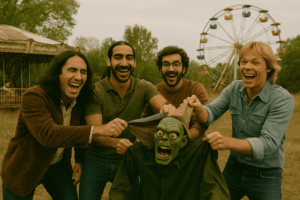Between Sound and Specter: What AI Band "The Velvet Sundown" Asks of Us
It's truly astonishing how far AI-generated music has come, to the point where it can stir human emotions. As Tak@, a system integrator who helps bring your ideas to life, I'm closely watching these cutting-edge developments.
The Sudden Emergence of an AI Band
Have you heard of "The Velvet Sundown," the AI band that suddenly captivated audiences on digital music streaming service Spotify, rapidly gaining over a million monthly listeners? Their songs and promotional photos, all said to be created by generative AI, sent shockwaves through the music scene.
Spotify's Explosive Popularity and the Start of Suspicions
The Velvet Sundown quickly accumulated over 550,000 monthly listeners on Spotify in just a few weeks, then surged past 1 million, and later over 1.4 million. Their music is soft-rock indie ballads, with "Dust on the Wind" racking up over 1.8 million plays.
However, several strange anomalies surrounded this band.
The four musicians supposedly in the band never gave interviews, nor did they have any personal social media accounts. There were no records of live performances whatsoever. Soon, suspicions arose that their very existence might be AI-generated.
As an SIer, I'm used to these kinds of "sudden buzz-creating" tactics, but I felt this was a particularly sophisticated case.
Confusion Caused by a Self-Proclaimed "Spokesperson"
As doubts deepened, the situation grew even more chaotic. A person named Andrew Frelon operated what he claimed was the "official" X (formerly Twitter) account for The Velvet Sundown, "@Velvet_Sundown," and spread elaborate hoaxes to the media, stating that the songs were generated using the AI tool Suno.
However, shortly after Rolling Stone magazine reported on the matter, Frelon himself confessed that "it was all an intentional deception to test the media." In response, The Velvet Sundown's official Spotify page released a statement completely denying any relationship with Frelon.
Thinking back, my hobby of developing services also started from a mere whim. This whole incident throws a heavy question at us about the reliability of information in the digital age.
The Fake That Exposed Media Weaknesses
Andrew Frelon's confession wasn't just a prank by a mischievous trickster. Through his actions, he pointed out "a major flaw in journalism's information verification process."
The Fragility of Journalistic Verification
Frelon stated that journalists tend to ignore the best practices for fact-checking and verification in their pursuit of "timely news." He criticized that a large number of journalists are "disregarding parts of their ethical code to meet tight deadlines."
Indeed, many journalists reportedly contacted his fake account via X's direct messages.
This case highlights how easily information scrutiny can be neglected in a modern era that demands rapid news. I myself keenly feel daily that accurate information is paramount in system development, and this issue is certainly not someone else's problem.
The "Truth" According to The Velvet Sundown
So, what does the real The Velvet Sundown have to say? According to a statement on their official X account, "@tvs_music," their project is described as a "synthetic music project guided by human creative direction, with music, vocals, and visuals composed and brought to life with AI support."
They emphasize that all the characters, stories, music, voices, and lyrics are "original creations" generated using AI tools as "creative instruments."
Their statement is highly suggestive: "Neither human nor machine. The Velvet Sundown lives in between." This implies that AI is positioned not just as a "generation device," but as a "co-creator."
AI Music Shakes Up Copyright and Revenue Models
The success of The Velvet Sundown is sending ripples throughout the entire music industry. The rapid increase in AI-generated music has begun to significantly impact copyright issues and artist earnings.
Growing Concerns About AI Music and Platform Responses
Deezer, a competing music streaming service, reported that their AI detection tool identified The Velvet Sundown's tracks as "100% AI-generated."
This means that even if humans provided creative direction, the final output was judged to have very substantial AI involvement.
Spotify co-founder and CEO Daniel Ek is generally optimistic about AI's potential impact on music, but he states that he "doesn't agree with using AI to imitate existing artists."
While Spotify doesn't have a policy to label AI music as "AI-generated," they will not manually recommend it in playlists and prohibit AI tracks that imitate real artists.
However, The Velvet Sundown's success seems to stem from their songs being included in popular playlists like "Discover Weekly," which are automatically generated by Spotify's algorithms.
Meanwhile, strong concerns are being raised from the music industry. Ed Newton-Rex, founder of Fairly Trained, criticized The Velvet Sundown's incident, saying it was "theft disguised as competition."
He warns that AI companies are "stealing" artists' works for training data and then flooding the market with "imitations," which risks reducing revenue for human musicians.
Prominent artists like Dua Lipa and Elton John have also lobbied for new legislation regarding AI and copyright, but this has not yet succeeded.
Algorithms Usher in a New Artist Archetype
Interestingly, beyond The Velvet Sundown, many other AI-generated artists already exist on Spotify, collectively gaining millions of monthly listeners. Examples include country artist Aventhis, The Devil Inside, and Marvin Gaye-inspired Nick Hustles.
This indicates the reality that AI is transcending its role as a mere tool and is gradually being accepted by the market as a "new artist."
It means a new ecosystem is emerging where platform algorithms "discover" optimal content to match user preferences, resulting in AI-generated music naturally reaching people's ears.
However, this also raises concerns that "authentic art" painstakingly created by humans could be buried in the "noise" of mass-produced AI content. I, too, deeply feel the immense power of these algorithms in my daily service development, where being "discovered by users" is crucial.
"Creativity" and Our Role in the AI Era
The rise of AI music prompts fundamental questions about what "creativity" is and what role humans play.
Rethinking the Definition of Creation
As Spotify CEO Daniel Ek questioned, "What is future creativity with AI? What is music?", we are now facing an era where the boundaries of "authorship" and "identity" in art are becoming blurred.
The Velvet Sundown's statement, "Neither human nor machine. It lives in between," suggests the possibility of AI not just as a tool, but as a new entity that merges with human creativity.
I hope that the AI tools I create will also remain "support roles" to enhance human creativity. AI is an entity that makes us think more deeply about the question "What do we want to create?" and expands the means to achieve it.
Conclusion: Towards a Future of Co-creation with AI
The story of The Velvet Sundown has confronted us with the reality that AI has leapt to the forefront of content creation. The fake scandal highlights the heavy responsibility of media and each of us to ensure information reliability as technology evolves.
At the same time, the "in-between" existence that the real The Velvet Sundown describes — between human and machine — teaches us that AI is beginning to play the role of a "co-creation partner," extending human creativity, rather than just being an automated generation tool.
AI is already impacting copyright and revenue structures in the music industry, and platforms like Spotify are now seeing algorithms birth new stars. This is just the prologue to a future where AI will be involved in various aspects of our work and lives.
How will we face the world AI creates and find true value within it?
Perhaps the "journey" of mastering the new tools AI offers, while refining our uniquely human sensibilities and ethics, and constantly asking questions, has only just begun. I hope this column serves as a catalyst for you to consider your future with AI.



